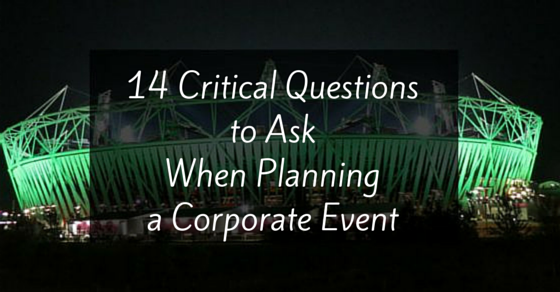14 Questions to Ask (and Answer!) When Planning a Corporate Event
Hold a knock-out event to jumpstart your business
One great way to jump start your business is to hold a knock-out event. Depending on your field, this could be a grand opening, a group seminar, a TweetUp (or MeetUp) or any number of other possibilities.
A sure way to get bad PR is to botch said event, leaving disgruntled and disappointed potential clients and contacts griping about your name. Yep, that would be BAD.
So, as in most aspects of life, the greatest path to success is to pre-plan, perhaps so much that you feel you have lived the event before it actually happens. Think it through as the organizer, as a worker and again as a participant. Murphy’s adage, “What can go wrong will go wrong” is not necessarily true, but what can go wrong MIGHT go wrong, and that’s already something that needs to be dealt with. In the pre-planning stage, ask yourself (and perhaps staff members and trusted advisors):
- How many people might I be expecting?
- What is the appropriate level of formality for this event?
- What refreshments do I need to serve, as per formality, time of day, and the culture of my audience?
- How will people register and, if you have so chosen, remit payment for the event?
- How will participants receive any written material pertaining to the event?
- Are specific directions, both to the location and within the location necessary?
- How will I inform people about the event?
- How will I receive feedback?
- How will I get information to participants during the event? (a/v equipment, microphone, handouts, social media with a specified hashtag)
In short, spend at least a few days keeping a running list of issues that need to be decided and that could pop up. Troubleshoot your guts out.
Next, select a venue. Do a little shopping around, as places change over time. You’ll need a place appropriate for the formality of the event. It will need to be easy for your audience to find, have adequate parking and comfortably fit the number of attendees you expect. Having a venue that is too big might sound like it makes sense “just in case”, but your audience will look dwarfed, giving a no-show feeling even if you have many participants.
If it’s been a while since you’ve physically visited a chosen venue, go. Have a look. Sit on the chairs. Would you feel comfortable sitting there for the duration of whatever event you are planning? And seriously, check out the bathrooms. People talk. Don’t have them talking about the sorry state of the bathrooms. Have a discussion with the managerial staff of your chosen venue. What does the cost include? In the hotel industry particularly, there are often hidden extras. Uncover them.
- What would the cost be for the refreshments you have in mind?
- Could you, alternatively, bring your own refreshments? Is there a fee associated with that?
- Does this price include access to a laptop, projector, or other audio visual equipment you will be needing? If not, what associated cost will that add? Can you bring your own equipment?
- Is there a charge associated if the event goes overtime? How much?
- When and how does the venue expect payment?
Next – cost of the event – both for you and for your participants. Do you expect to have your expenses immediately covered by a charge per participant? Do you have sponsors? Is this an investment on your part to gain future profits by growing your business? When setting your price, remember – things happen. There will be people who cancel their registrations. Last minute expenses may come up. Especially if this is the first time you’ve done an event and very especially if you haven’t pre-planned enough, there may be surprises. Determine your price. Be specific as to what it covers.
Work out your registration system and make sure it is foolproof. You can have people phone, send in emails or use an online registrations system such as EventBrite. Just to make sure there are no glitches, and register yourself first, surveying that all is well.
Advertise! Social media is the way to go today, but some audiences might respond to specifically directed print advertisements as well. Know who your target audience is and reach them – in whatever way it takes. (Walking billboard, anyone?)
As your registrations roll in, figure out the details of the venue in relation to your event. On arrival, is it clear where participants should go? If it isn’t absolutely obvious, (and maybe even if it is) make signs. Signs should never be hand lettered. It’s part of your first impression and therefore must be crisp and professional. At least use a clear font on clean paper and include your logo. Even if you’re having a MeetUp in a café, have a sign on the table announcing your group.
If you’re planning a large event, consider having an organized, trusted person, perhaps even hiring a professional to assist in directing your event. Will you be able to single-handedly be the MC, take questions from and directives to the presenters, participants and venue staff, distribute handout material… if even thinking of all this makes you dizzy, you’ll probably need help.
I wish you the very best of success in your event and your business. Remember the best line to use when welcoming your crowd, “I would like to welcome you and let you know we will be reminding you to turn your cellphone back on at the end of the evening.”
 Submitted by Aviela
Submitted by Aviela

